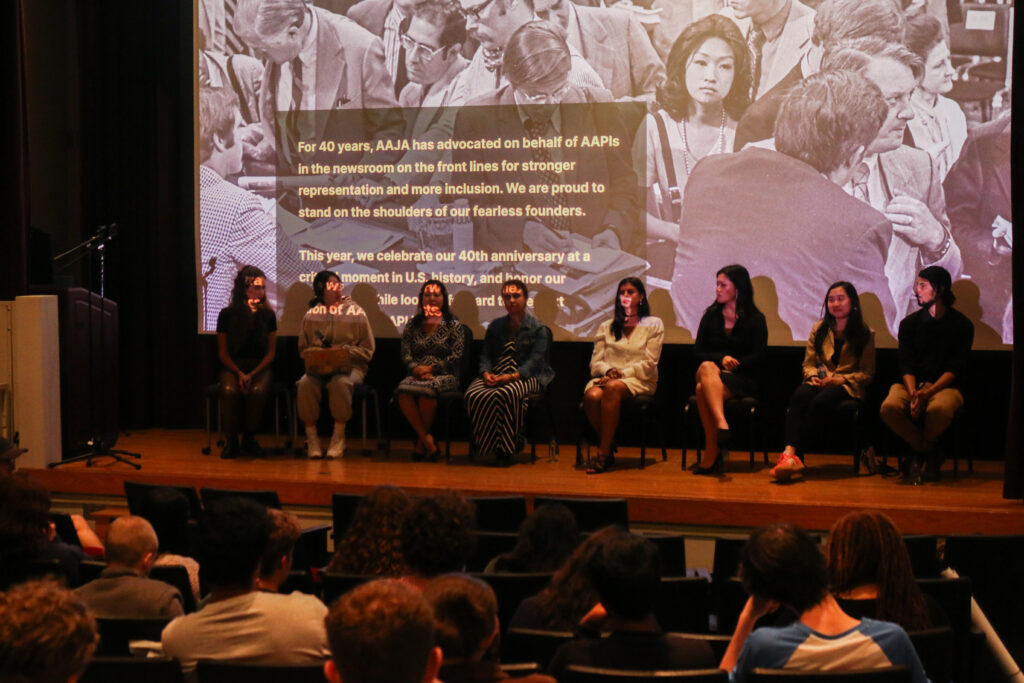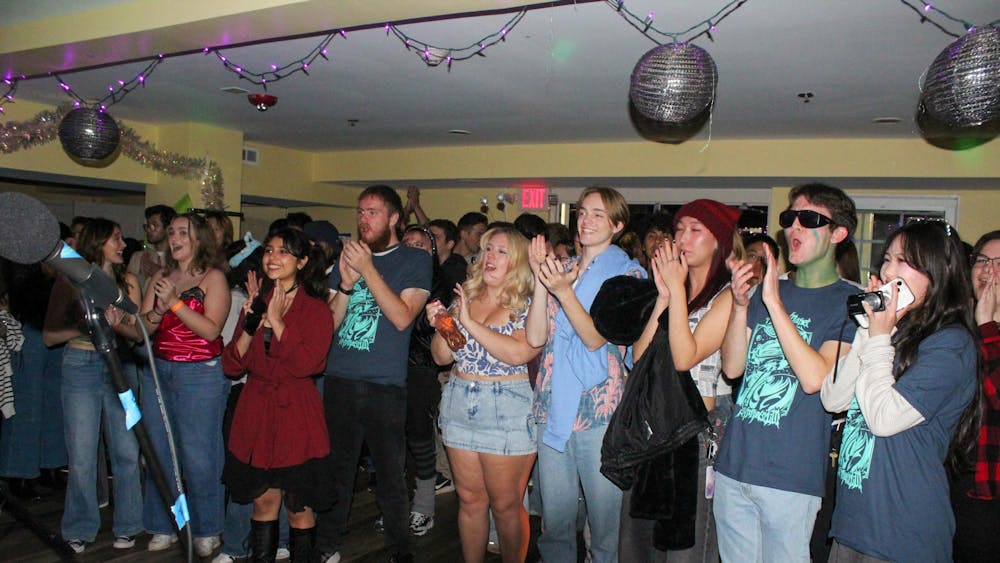 (Hayley Powers/Visual Editor)
(Hayley Powers/Visual Editor)
In the current world of charged politics, journalism serves an increasingly important role with its “media credibility” and the sense of truth it gives to readers amid accusations of fake news, Ritu Shukla, a writer and producer for CNN, said.
Students passionate about journalism gathered in Harland Cinema on Oct. 26 for a Q&A event. Professional journalists from the Atlanta chapter of the Asian American Journalists Association (AAJA), an organization advocating for Asian Americans and Pacific Islander (AAPI) journalists, visited Emory to educate students on journalism careers.
The Emory Wheel organized the event. Editor-at-large Eva Roytburg (22Ox, 25C) and Diversity, Equity and Inclusion Task Force editor Emma Kingwell (26C) moderated the event. The panelists included president of AAJA’s Atlanta Chapter Mallika Kallingal, vice president of AAJA’s Atlanta Chapter Kelly Yamanouchi, CNN Marketing Specialist Jain Kim, CNN international producer Erika Wakabayashi, Atlanta Journal-Constitution visual photojournalist Arvin Temkar and Shukla.
“This is an industry that’s a lot about networking as well as your skills,” Shukla said when she talked about the significance of the event. “They go hand-in-hand, and that's where AAJA can help you.”
Students seated themselves before the event began at 7 p.m. Roytburg and Kingwell kicked off the program with a 30-minute Q&A. They had prepared a list of questions, starting off by asking what initially drew the panelists into journalism.
The panelists shared different experiences. While Shukla and Wakabayashi received degrees in journalism, some panelists did not, including Kim and Temkar.
Roytburg and Kingwell also asked the panelists’ about their most impressive journalistic achievements. Kim said she felt AAPI individuals’ sorrows during the COVID-19 pandemic, and she successfully pitched a related op-ed to CNN. Shukla talked about being asked last-minute to take on the job of both a reporter and a camera person during a brief interview with the notable baseball player Hank Aarons. Wakabayashi reflected on her heart-wrenching interview with a 9/11 survivor.
After discussing the significant milestones in their careers, the panelists discussed skills that are integral to journalism, such as thinking quickly.
The panelists also reflected on journalism’s changing technological landscape and the new prominence of short videos. Kallingal, who is also the president of AAJA’s Atlanta chapter, emphasized the undaunted courage of journalists to ask questions, Kim brought up the indispensable journalistic curiosity about the world as an important adaptive skill. Wakabayashi stressed the need to look for answers and said that there are no dumb questions in journalism.
The event then transitioned to an audience Q&A session. Students inquired about minorities' representation in journalism as well as how artificial intelligence is influencing the industry.
Kallingal laughed when she shared that her colleague joked about AI replacing journalists’ jobs. She believes machines can never take over humans’ ability to think and feel.
Many panelists encouraged students to network and attend AAJA workshops.
“Go to different events and make connections with people,” Temkar said. “That’s something that I didn’t do as much when I was younger, and I found it very helpful and not as scary as I thought it would be.”
Kallingal later introduced AAJA’s mission to advance diversity in newsrooms and ensure fair and accurate coverage of communities of color. Kallingal emphasized that AAJA not only provides resources for young journalists, but for anyone looking to educate themselves on social issues. The AAJA website features articles correcting misrepresentation about people of color in the news, such as misinformation surrounding the Atlanta spa shootings.
Passionate conversations ensued after the event as students and journalists mingled. Students shared their thoughts on the discussion and asked the journalists more detailed questions.
Rhett Burnham (23Ox, 25B) said he learned about the importance of professional connections and networking from the event.
Students and journalists exchanged their LinkedIns, emails and numbers in their conversations.
“Organizations like the AAJA give you exposure to people inside the industry,” Shuklar said. “Sometimes high-profile editors that you might not have access to if you're just studying at home.”
Yash Chaturvedi, a first-year graduate student from Georgia Institute of Technology, attended the event. He writes for Technique, the student-run newspaper at Georgia Tech, where he heard of the opportunity to meet AAJA members at Emory. Coming from India, Chaturvedi said that journalism has helped him as an international student to find belonging with other students and connect to campus events.
“They said that journalism can be hard and can be unrewarding, so you have to be passionate about it,” Chaturvedi said. “I felt it was a very honest question about people’s experiences, and it was also super inspiring because I always have this doubt in my head: How do you make that transition into a full-time career? These things give me a lot of inspiration when there’s a community of Asian American journalists who are here to help you.”
“I’m really glad there was a good student turnout, and I hope that everybody can come to our events in the future,” Temkar said.
The panelists encouraged students to sign up for future events hosted by AAJA’s Atlanta chapter at their EventBrite website, including mixers and early career journalism workshops.
“Three things to remember: be respectful, don’t be afraid to ask questions and don’t have imposter syndrome,” Kallingal said on a concluding note.







